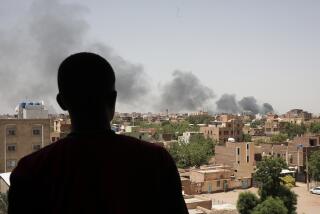Panel Frowns on Efforts to Buy Sudan Slaves’ Freedom
NAIROBI, Kenya — The list of people who have paid cash to buy Sudanese slaves their freedom includes prominent African Americans, college students in Liberty, Mo., and even a baroness in the British House of Lords.
But a U.S.-led commission on slavery in Sudan has frowned on the practice, known as slave redemption or buyback, saying in a recent report that it should not be supported.
The report by the eight-member panel, appointed in February on the recommendation of the U.S. peace envoy to Sudan, former Sen. John C. Danforth, could hamper fund-raising efforts by the mainly Christian groups that buy slaves to set them free.
In the last several years, the groups’ grass-roots campaigns have generated significant cash from individual donors, church members and even schoolchildren who have turned over their lunch money to help the cause.
Critics, however, say well-meaning charities help perpetuate the slave trade by prompting slavers to capture more people so they can be sold to the redemption programs.
Aid workers in Nairobi, the Kenyan capital, recently suggested that many of those being “liberated” were never abducted in the first place but merely posed as slaves to get a share of the money--up to $100 a person--paid to secure their release.
Slave redemptions have become such a lucrative enterprise that the rebel Sudan People’s Liberation Army, which has been fighting a 19-year civil war for autonomy in the country’s south, has reportedly entered the business.
“It’s a huge scam operation,” said Jim Jacobson, president of Virginia-based Christian Freedom International, which discontinued its buyback program three years ago after discovering that donors’ money bankrolled the purchase of weapons, munitions and luxury items for some rebel leaders.
Some international humanitarian groups agree.
“Knowledge that there are foreigners willing to pay to redeem slaves can only spur on unscrupulous individuals to make a business out of redemption,” Human Rights Watch officials said in a recent report. “Unscrupulous middlemen may ‘borrow’ children who have never been abducted.... Thus, foreigners intending to do good may be deceived.”
Slavery in Sudan, Africa’s largest country, is a byproduct of the civil war, which has killed an estimated 2 million people--largely from famine--and driven 4 million from their homes. The conflict pits the Islamic government in the north against militias in the mainly Christian and animist south.
Human Rights Watch and other groups say the Khartoum government provides automatic weapons and support for fighters who attack southern villages and capture men, women and children of the Dinka tribe from rebel-controlled areas.
Sudan’s government acknowledges that there are abductions in the country but has denied the existence of slavery. But members of the U.S.-led slavery commission said they interviewed numerous former slaves in government- and rebel-held areas in April.
“We are witnessing a resurgence of a set of practices that most people felt had disappeared,” said Penn Kemble, head of the panel including members from the U.S., Britain, Italy, Norway and France.
“We were quite troubled by the fact that many people in the international community have treated [the slave problem in Sudan] as a leftover of a backward society. The problem is real,” he said.
The group recommended that Sudan’s president, Lt. Gen. Omar Hassan Ahmed Bashir, launch a national campaign against slavery.
In an interview, Kemble said “legitimate concerns” have been raised about slave redemption. Officials who deny slavery exists can point to the scam buyback programs “to say that what is happening here is not actual slavery but some kind of racket,” he said.
Kemble said his panel was not able to establish how many people have been abducted and enslaved. Estimates of those held in captivity range from 14,000 to more than 100,000. Sudan has a population of about 35 million.
The Swiss-based charity Christian Solidarity International said that between 1995 and 2001, it redeemed 60,000 Sudanese slaves, paying $33 to $100 each.
John Eibner, a senior official with the group, said Monday that Kemble’s panel didn’t seriously investigate the allegations about slave redemption programs. CSI, Eibner said, would be undeterred by Kemble’s “hard-line” position against the programs.
“CSI will spare no effort to liberate slaves still in bondage,” he said. “It would be unpardonable to leave women and children enslaved, subjected daily to unspeakable physical and psychological abuse, in the absence of a functional alternative.”
More to Read
Sign up for Essential California
The most important California stories and recommendations in your inbox every morning.
You may occasionally receive promotional content from the Los Angeles Times.










